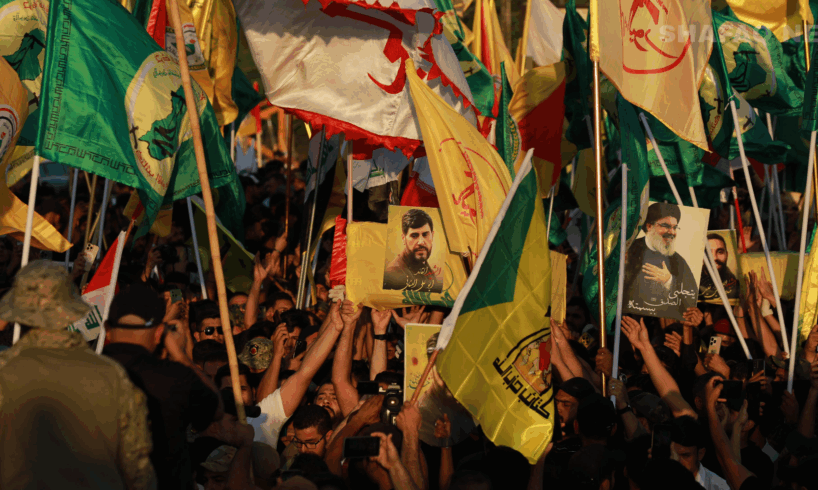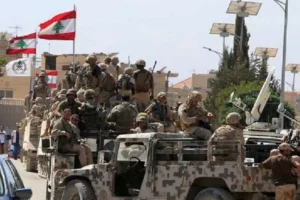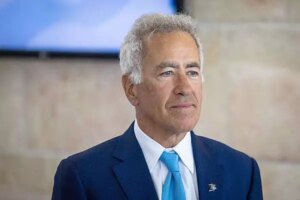
Shafaq News
The Lebanese government’s decision to restrict all weapons to
state control—including those held by Hezbollah and other non-official armed
groups—has sparked strong internal and regional debate. The United States
welcomed the move, but Hezbollah condemned it as a major “sin,” warning against
what it sees as an externally driven agenda.
Although the mechanism for implementation remains unclear, the
announcement has reignited conversation in Iraq, where similar calls persist to
disarm “non-state actors” and dissolve armed factions outside the official
military framework. Yet experts caution that Lebanon’s path is not easily
replicated in Iraq.
Hezbollah Disarmament: A Divisive Turning Point
The Lebanese decision marks an unprecedented step in the country’s
political history, following the endorsement of provisions outlined in US envoy
Tom Barrack’s proposal. Supporters view it as an extension of the ceasefire
agreement and UN Resolution 1701. Critics, led by Hezbollah and its allies,
denounce it as “submission to American and Israeli conditions.”
Hezbollah maintains it has fulfilled its commitments under
Resolution 1701 and the November 2024 ceasefire, including withdrawing from
areas south of the Litani River, while accusing Israel of failing to withdraw
from five border points and continuing daily assassinations of civilians and
its members.
The presidency and the prime minister’s office prioritize
disarmament, but Hezbollah and its allies insist that Israel must first vacate
Lebanese territory and release prisoners before any internal dialogue on a
national defense strategy can begin. This deadlock shows no sign of resolution,
prompting the Lebanese Army to deploy reinforcements nationwide to contain
potential unrest.
Political analyst Mohammad Hamieh told Shafaq News the army itself
has not agreed to disarm Hezbollah. The cabinet, he explained, discussed the US
proposal without full consensus—especially after the withdrawal of a major
Shiite bloc representing the resistance movement, which disrupted quorum.
Instead of full ratification, the cabinet set general goals and tasked the army
with preparing a plan by August 31 to consolidate weapons under state control.
Despite this looming deadline, Hezbollah remain defiant. “Death is
easier than surrendering our arms,” declared Mohamad Raad, head of the group’s
parliamentary bloc.
Formed in 1982 after Israel’s invasion, Hezbollah rose as a
resistance force, achieving the withdrawal of Israeli forces in 2000 and later
fighting the 2006 war—framed by party officials as a “divine victory.” Since
the Taif Agreement, successive governments have affirmed Lebanon’s
“right—through its people, army, and resistance—to liberate occupied
territory.” That consensus has eroded, especially after Hezbollah’s recent
military losses against Israel.
Observers say the current political climate echoes the divisions
preceding the 1982 invasion and the collapse of the US-brokered May 17, 1983
Accord.
Hezbollah remains popular and influential, securing the highest
number of parliamentary votes in the last election. Yet the scale of its
arsenal post-war remains unclear. The group’s role in the “unity of fronts”
doctrine, coordinating with Iran’s allies during the conflict, keeps it central
to regional strategy.
Lebanon’s Debate, Iraq’s Question
Hamieh warned against generalizing Lebanon’s still-unresolved
situation to the wider region. International pressure, he said, seeks to
replicate the Lebanese model in Iraq and Syria despite key differences.
In Iraq, the Popular Mobilization Forces (PMF) operate under a
formal government framework. “There is a clear agreement between the government
and the PMF, which played a successful role in combating terrorism,” Hamieh
explained. “Lebanon, by contrast, has no such formal agreement—just political
coexistence.”
Unlike Lebanon, Iraq faces no Israeli occupation, and disarmament
discussions focus more on potential threats from Syria—matters that could be
addressed under a state-approved defense strategy.
Could it Happen in Iraq?
Iraqi security and legal experts agree that Iraq’s complex
political environment and entrenched regional ties make a Lebanese-style
disarmament move unlikely for now.
Legal expert Mohammad Jumaa noted that Iraqi law, including the
Weapons Law and Penal Code, criminalizes the possession or use of arms outside
state authority. “Any weapon outside the state’s structure is illegal,” he told
Shafaq News, “whether licensed without official permission, or entirely
unlicensed.” Penalties are harsher for military-grade arms.
Strategic analyst Ahmad al-Sharifi argued that dismantling armed
factions in Iraq is blocked by entrenched power-sharing and the dominance of
the Shiite Coordination Framework, which backs the current government. “The
government, as a product of that framework, cannot make decisions that run
counter to its interests or Iran’s preferences,” he said.
In Lebanon, al-Sharifi stressed it is too soon to judge the
outcome, given Hezbollah’s resistance and the possibility of armed
confrontation with the Lebanese Army. He added that Iraqi factions—like
Hezbollah—view their weapons as central to their political and ideological
identity, making voluntary disarmament unrealistic. Forced dissolution, he
warned, could trigger direct clashes with the state or external intervention,
including targeted strikes by the United States or Israel if the government
fails to impose control.
Not Applicable—For Now
Security expert Alaa al-Nashou concurred that Iraq’s situation is
fundamentally different. Iraqi factions never fought Israel and lack the robust
military and economic infrastructure that Hezbollah has developed. Iraq’s party
system is also more fragmented, with parts of the state openly supporting armed
factions and in some cases preferring them to the official army.
He attributed the state’s weakness to “deep Iranian influence in
its institutions and the absence of strong regional or international backing,”
which limits Baghdad’s ability to curb non-state arms.
While Lebanon’s disarmament plan is bold in its own context,
analysts agree it is unworkable in Iraq for the time being. Obstacles go beyond
legal prohibitions to include political realities, security dependencies, and
the institutional integration of factions into the state’s power structure.
Without a fundamental shift in political will and regional alignments, the
Lebanese precedent is unlikely to cross into Iraq.
Written and edited by Shafaq News staff.





